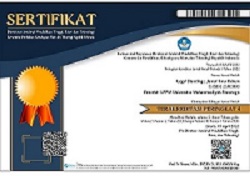TINDAK PIDANA MEMPRODUKSI KOSMETIKA TANPA IZIN PRODUKSI DAN TIDAK MEMENUHI STANDARD PERSYARATAN KEAMANAN
DOI:
https://doi.org/10.24269/ls.v8i2.8915Abstract
Consumers who want to improve their appearance are often attracted to cheap cosmetics because they provide fast results. This is what makes them look for alternative ways by buying these products even though they may not meet the requirements and these cosmetics are sold freely but do not have a BPOM number. The aim of this research is to analyze liability in the production of cosmetics without a production permit and do not meet standard safety requirements and legal protection for consumers who use cosmetics which are produced without a production permit and do not meet standard safety requirements. This research uses normative legal research method. The results of the research show that the defendant in this case has fulfilled the elements for which a sentence can be carried out. The first element is an act carried out in accordance with Article 197 of Law of the Republic of Indonesia Number 36 of 2009 concerning Health, the second element violates Article 106 of Law of the Republic of Indonesia Number 7 of 2014 concerning Trade, and the third element violates Article 62 paragraph (1) Jo. Article 8 of Law of the Republic of Indonesia Number 8 of 1999 concerning Consumer Protection. Consumers experience losses as a result of using cosmetics that are produced without a production permit and do not meet standard safety requirements, so the defendant is required to compensate consumers for losses incurred in accordance with the provisions of Article 7 letter f with administrative sanctions in accordance with Article 60 Paragraph (2) Law of the Republic of Indonesia Number 8 of 1999 concerning Consumer Protection and criminal sanctions contained in Article 62 Paragraph (1) of Law of the Republic of Indonesia Number 8 of 1999 concerning Consumer Protection.
References
Alğin Yapar, E. (2017). Herbal cosmetics and novel drug delivery systems. Indian Journal of Pharmaceutical Education and Research, 51(3), S152–S158. https://doi.org/10.5530/ijper.51.3s.3
Ariman, H. M. R., & Fahmi, R. (2016). Hukum Pidana. Setara Press.
Azad, N., & Masoumi, M. (2012). The impact of packaging on product competition. Management Science Letters, 2(8), 2789–2794. https://doi.org/10.5267/j.msl.2012.10.008
Chen, T., Luh, D.-B., & Wang, J. (2024). Product family modeling technology for customized cosmetic packaging design based on basic-element theory. Journal of Dermatologic Science and Cosmetic Technology, 1(1), 100002. https://doi.org/10.1016/j.jdsct.2023.12.002
Elvira, F. G., Damayanti, S. S., Theodora, G., & Nadina, O. (2020). Analysis of Electric Bicycles as a Vehicle Inindonesia: A Normative Legal Review. Jurnal Hukum Dan Pemikiran, 20(1), 89–103.
Fajar, M., & Achmad, Y. (2010). Dualisme Penelitian Hukum Normatif dan Empiris. Pustaka Pelajar.
Hadjon, P. M. (1994, November). Pengkajian Ilmu Hukum Dogmatik (Normatif). Majalah Yuridika Fakultas Hukum Unair.
Huijbers, T. (1982). Filsafat Hukum Dalam Lintasan Sejarah. Kasius.
Johny, I. (2006). Teori dan Metodologi Penelitian Hukum Normatif. Bayu Publishing.
Kementerian Kesehatan Republik Indonesia. (2011). Pedoman Pelaksanaan Pelayanan Izin Produksi Kosmetika. Kencana Prenada Media Group.
Khan, N. H., Ullah, F., Khan, T. A., Zafar, U., Khan, M. F. A., Mustaqeem, M., Shah, S. S., Wu, D. D., & Ji, X. Y. (2021). Personal-care cosmetic practices in pakistan: Current perspectives and management. In Clinical, Cosmetic and Investigational Dermatology (Vol. 14, pp. 9–21). Dove Medical Press Ltd. https://doi.org/10.2147/CCID.S270667
Marzuki, P. M. (2009). Penelitian Hukum. Kencana Prenada Media Group.
Mondello, A., Salomone, R., & Mondello, G. (2024). Exploring circular economy in the cosmetic industry: Insights from a literature review. Environmental Impact Assessment Review, 105, 107443. https://doi.org/10.1016/j.eiar.2024.107443
Muliyawan, D., & Suriana, N. (2013). A-Z tentang Kosmetik. PT Elex Media Komputerindo.
Muwahid. (2017). Metode Penemuan Hukum (Rechtsvinding) oleh Hakim dalam Upaya Mewujudkan Hukum yang Responsif. Al-Hukama, 7(1), 25–48.
Nugraha, X., & Katherina, A. M. F. (2003). Tanggungjawab Promotor Perseroan Terbatas terhadap Kontrak Pra Inkorporasi di Indonesia. Media Iuris, 2, 127–155.
Otto, J. M. (2003). Kepastian Hukum di Negara Berkembang. Komisi Hukum Nasional.
Rostamailis. (2005). Penggunaan Kosmetik, Dasar Kecantikan, dan Berbusana yang Serasi. Rineka Cipta.
Saniati, F., & Wilujeng, B. Y. (2020). Analisis Produk Kosmetik Make Up Salah Satu Merek Global Terhadap Keputusan Pembelian (Vol. 09).
Septianingrum, Y., Safrina, U., Puspita, N., & Surahman, S. (2023). Gambaran Tingkat Pengetahuan tentang Period After Opening (PAO) dan Perilaku Penyimpanan Kosmetika Perawatan pada Remaja di Kota Tangerang. Jurnal Sains Dan Kesehatan, 5(1), 6–13. https://doi.org/10.25026/jsk.v5i1.1478
Sera Fauzela, D., & Dardanila, M. (2023). Perlindungan hukum bagi konsumen terhadap produk kosmetik yang mengandung bahan berbahaya dalam jual beli online (e-commerce) legal protection for consumer of dangerous cosmetics in e-commerce.
Soekanto, S. (1999). Beberapa Permasalahan Hukum dalam Kerangka Pembangunan di Indonesia (Suatu Tinjauan secara Sosiologis). Universitas Indonesia.
Soekanto, S., & Mamudji, S. (2003). Penelitian Hukum Normatif: Suatu Tinjauan Singkat. Raja Grafindo Persada.
Sutedi, A. (2008). Tanggung Jawab Produk dalam Hukum Perlindungan Konsumen. Ghalia Indonesia.
Downloads
Published
How to Cite
Issue
Section
License

Legal Standing : (Jurnal Ilmu Hukum) is licensed under a Lisensi Creative Commons Atribusi-BerbagiSerupa 4.0 Internasional.

.png)

